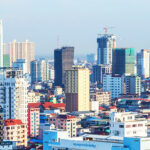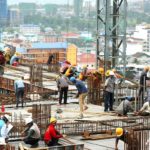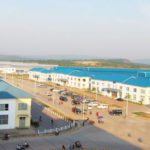
02 Jan Executive outlook for Cambodia in 2020
Despite internal and external challenges, the Cambodian economy reached even greater heights last year, with the government reporting economic growth of 7.1 per cent – the highest in the Asean region.
However, China-US trade tensions and protectionist policies remain obstacles, with the government forecasting 6.5 per cent economic growth this year due to a downturn in total exports.
While speaking to The Post’s May Kunmakara, key ministers and private sector leaders expressed optimism over Cambodia’s measures to ensure growth and mitigate negative impacts.
Aun Pornmoniroth, Minister of Economy and Finance
Cambodia’s economy is projected to have grown by approximately 7.1 per cent last year compared to 7.5 per cent in 2018. Growth is expected to slow to just 6.5 per cent in 2020, pushing GDP to some $29.362 billion. Per capita income is expected to grow to $1,816 compared to $1,679 last year.
The industrial sector is expected to continue to decelerate to 8.9 per cent this year from 10.7 per cent in 2019 due to expected slower growth in the garment and construction sub-sectors, although non-garment sub-sectors will fare much better when compared to last year.
Meanwhile, the service sector is expected to grow at 6.4 per cent, lower than the 6.7 per cent last year due to slower growth in the real estate sub-sector.
The wholesale and retail sub-sectors, including hotels and restaurants, will maintain the growth [of last year]. The agricultural sector will also achieve the same growth rate of 1.7 per cent as in 2019.
The annual inflation rate this year will remain manageable at 2.9 per cent, while the exchange rate is expected to remain stable at 4,056 riel per US dollar.
To conclude, based on the economic indicators, Cambodia is anticipated to achieve strong economic growth in the short- and medium-term. However, Cambodia’s economy will continue to face some challenges due to internal and external factors that can affect sustainable growth.
Pan Sorasak, Minister of Commerce
The Ministry of Commerce achieved a great deal last year, opening more markets and enhancing the Kingdom’s production capacity to supply both the domestic and export markets. At the same time, the ministry has made deep reforms to better serve the public, as well as enhance regulations and law enforcement to protect consumers.
Cambodia also successfully maintained an export growth rate of 10 per cent, though the Kingdom’s exports have experienced a few concerns due to the trade war and protectionist policies of economic superpowers.
In an effort to diversify export markets and work towards regional integration, last year some 15 countries joined negotiations for the Regional Comprehensive Economic Partnership – expected to be signed this year. We have also started a joint study on potential free trade agreements with South Korea and China.
With last year’s achievements behind us, we have already begun setting key goals for 2020 to help us pave the way for the country and its people to reach new heights.
We will achieve these ambitions through continued integration into the regional and global economy via the enhancing of production capacity to supply goods and services; preparing ourselves to embrace the digital economy and the Fourth Industrial Revolution; accelerating deep reforms and good governance; continuing to work hand-in-hand with the private sector; improving cross-border trade with neighbouring countries; and continuing to boost exports.
In Channy, President and Group Managing Director of Acleda Bank
I am excited to report that Acleda Bank Plc experienced healthy growth last year, with loan portfolios and deposits at seven per cent and 12 per cent respectively, while non-performing loans were around 1.2 per cent and revenue growth some 40 per cent compared to 2018.
This will not only form a strong foundation for growth this year, but also pave the way for overcoming the challenges of 2020.
We also eagerly anticipate Cambodia hosting the upcoming Asia-Europe Summit (Asem) as the more summits are attended, the more eyes are opened and business opportunities are presented to participant countries and individuals. It will enable participants to learn about Cambodia’s economic, social and political reality with the expectation they will enter the market in tandem with common investment partners and trade interests.
Sou Socheat, Director-General of the Securities Exchange Commission of Cambodia (SECC)
Last year, market capitalisation increased 157 per cent to $800.39 million. Currently, there are five listed firms and three companies offering bonds, raising up to $151 million last year. The number of investors increased to 22,338, 17 per cent of whom were foreign. The average trading volume was 1,750,502 shares per month, equal to $4,221,490 per month.
The year saw a huge increase in the number of market participants, such as the five central counterparties for the derivatives market, 27 derivatives brokers, and five fund management companies licensed this year, in addition to the five trustees already licensed by the Securities Exchange Commission of Cambodia (SECC).
To increase public awareness of the sector, we extended 56 training programmes to potential issuers, investors and professionals in 15 provinces with 5,662 participants. We increased international cooperation with regional and global market regulators by signing memorandums of understanding with South Korea, China, Myanmar, Thailand and Vietnam, among others.
The trading volume of derivatives last year increased to $120 million from $84 million in 2018.
In 2020, the Cambodia Securities Exchange (CSX) will be a valuable source of long-term capital for listed companies. Through the CSX, firms may raise funds to finance expansion plans, enhance competitiveness or improve their financial structure. Apart from issuing and listing common shares, public companies can raise additional capital through the issuing and listing of bonds.
There are seven companies that have submitted a letter of intent to issue bonds and stocks in 2020. Collective investment schemes will boost the market this year, with more funds to support the demand of Cambodia’s private sector.
Thourn Sinan, Chairman at Pacific Asia Travel Association (Pata) Cambodia Chapter
In general, 2019 was not a good year for Cambodia’s private sector as Siem Reap province was strongly affected by a decrease in international tourists and a five-star hotel closed on the last day of the year. However, we have experienced such a downturn in the past and are well prepared for 2020.
The Asem is going to contribute to Cambodia’s growth, and both the government and the private sector need to organise more international events and exhibitions to encourage greater economic activity, including in the tourism sector.
Chrek Soknim, President of Cambodian Valuers and Estate Agents Association (CVEA)
The real estate sector in Cambodia has steadily grown, especially over the last four to five years, with average growth of around 15 to 20 per cent annually.
The strength of the sector is due to a number of key factors, such as political stability, economic growth, a rise in income, the inflow of foreign direct investments and Cambodia’s strategic geographical location in the centre of Asean.
Last year, we did not see any signs of a slowdown in Cambodia’s real estate sector, and it will continue to grow for at least the next five to 10 years.
We forecast property prices to increase by more than 10 per cent, especially in the suburbs of Phnom Penh, as well as in Sihanoukville, Kampot and Siem Reap towns.
It is safe to say that I am optimistic regarding the real estate sector for the year ahead.
Source: Phnom Penh Post





